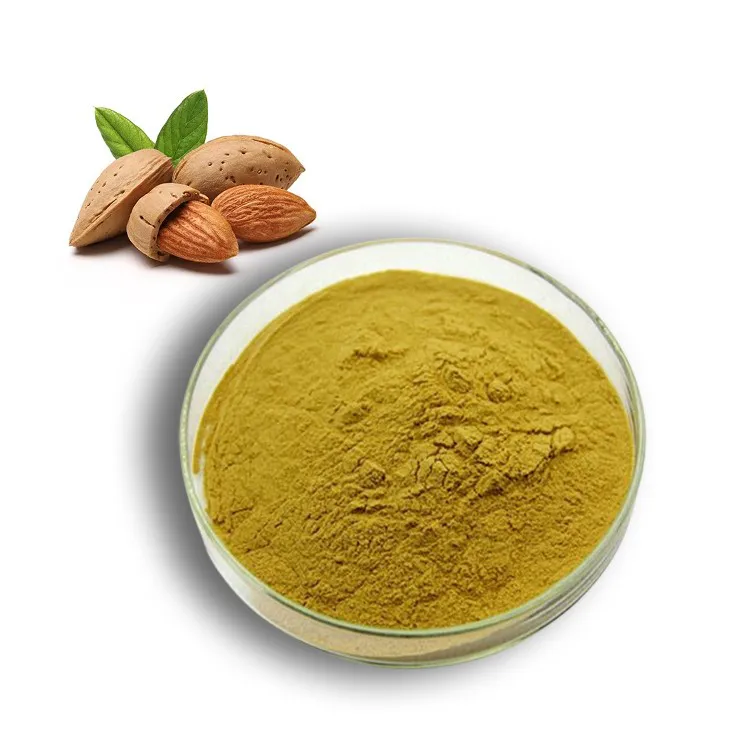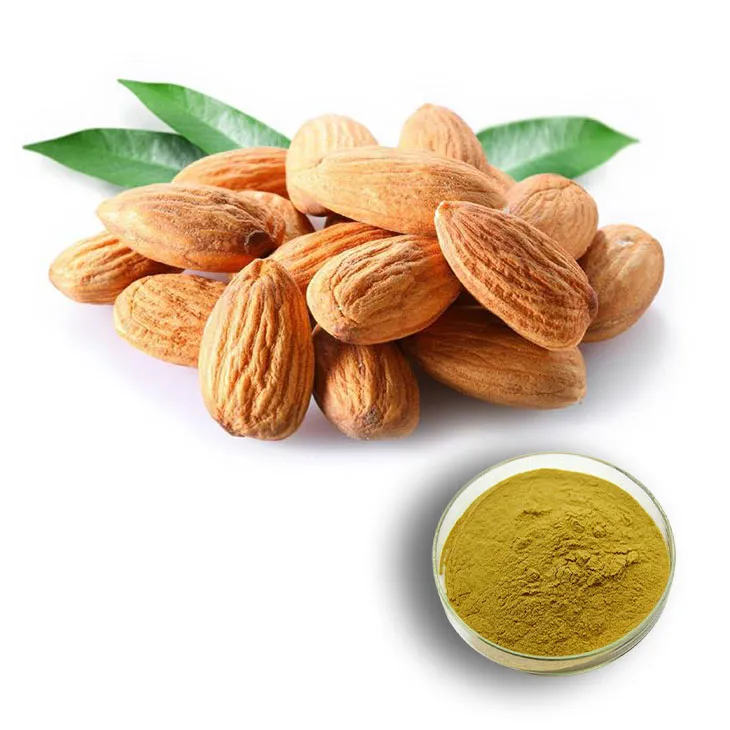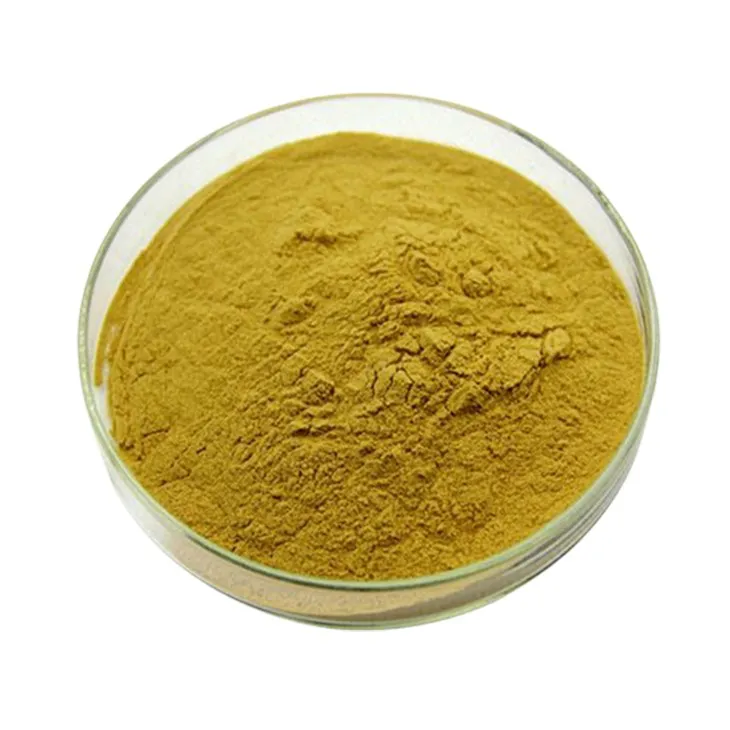- 0086-571-85302990
- sales@greenskybio.com
Almond extract powder can reduce high blood pressure.
2024-11-14

1. Introduction
Hypertension, or high blood pressure, is a significant global health concern. It is a chronic condition that affects a large proportion of the population and is a major risk factor for various cardiovascular diseases, such as heart attacks, strokes, and heart failure. Traditional antihypertensive drugs are commonly used to manage hypertension, but there is also growing interest in natural alternatives or supplements that may help in reducing blood pressure. One such potential natural remedy is Almond Extract Powder.

2. Composition of Almond Extract Powder
Almond Extract Powder is rich in several components that may contribute to its blood - pressure - reducing effects.
2.1 Unsaturated Fatty Acids
Unsaturated fatty acids, such as oleic acid and linoleic acid, are present in almond extract powder. These fatty acids have been associated with beneficial effects on blood lipid profiles and may also play a role in improving endothelial function. Endothelial function is crucial for the regulation of blood pressure as it affects the dilation and constriction of blood vessels. By promoting a healthy endothelial environment, unsaturated fatty acids in almond extract powder may help in reducing blood pressure.
2.2 Phytosterols
Phytosterols are another important component of almond extract powder. They are structurally similar to cholesterol and can interfere with cholesterol absorption in the intestine. By reducing cholesterol absorption, phytosterols may help in lowering blood cholesterol levels, which in turn can have a positive impact on blood pressure. High levels of cholesterol are often associated with atherosclerosis, a condition that can lead to increased blood pressure due to the narrowing and hardening of blood vessels.
2.3 Magnesium
Magnesium is an essential mineral that is involved in numerous physiological processes in the body. Almond extract powder contains magnesium, which may play a role in blood pressure regulation. Magnesium can act as a natural calcium channel blocker, which helps in relaxing blood vessels. When blood vessels are relaxed, the resistance to blood flow is decreased, resulting in a reduction in blood pressure. Additionally, magnesium is involved in the regulation of the renin - angiotensin - aldosterone system (RAAS), which is a key hormonal system in blood pressure control.

3. Evidence from Animal and Clinical Studies
Both animal and clinical studies have provided evidence regarding the potential of almond extract powder in reducing blood pressure.
3.1 Animal Studies
In animal models of hypertension, almond extract powder has been shown to have beneficial effects on blood pressure. For example, in rats with experimentally induced hypertension, supplementation with almond extract powder led to a significant decrease in systolic and diastolic blood pressure. These studies suggest that the components in almond extract powder, such as unsaturated fatty acids, phytosterols, and magnesium, may work together to exert antihypertensive effects in animals. However, it is important to note that animal studies have limitations and may not always directly translate to human physiology.
3.2 Clinical Studies
Clinical studies in humans have also shown promising results. In some small - scale clinical trials, participants who consumed almond extract powder as a supplement showed a reduction in blood pressure over a certain period. For instance, in a study involving hypertensive patients, those who took almond extract powder daily for a few weeks had a modest but significant decrease in both systolic and diastolic blood pressure compared to the control group. These findings indicate that almond extract powder may have potential as an adjunctive therapy for hypertension in humans.

4. Mechanisms of Action
The potential blood - pressure - reducing effects of almond extract powder may be attributed to several mechanisms.
4.1 Improvement of Vascular Endothelial Function
As mentioned earlier, the unsaturated fatty acids in almond extract powder can improve vascular endothelial function. A healthy endothelium is able to produce nitric oxide, which is a potent vasodilator. Nitric oxide relaxes the smooth muscle cells in the blood vessel walls, leading to dilation of the blood vessels. This dilation reduces the resistance to blood flow and subsequently lowers blood pressure. By enhancing endothelial function, almond extract powder may help in maintaining normal blood pressure levels.
4.2 Inhibition of Cholesterol Absorption
The phytosterols in almond extract powder inhibit cholesterol absorption in the intestine. High levels of cholesterol can lead to the formation of atherosclerotic plaques in the blood vessels. These plaques can narrow the blood vessels and increase the resistance to blood flow, resulting in elevated blood pressure. By reducing cholesterol absorption, almond extract powder may help in preventing the development of atherosclerosis and thus contribute to blood pressure reduction.
4.3 Regulation of Magnesium - Related Physiological Processes
Magnesium in almond extract powder plays a role in regulating various physiological processes related to blood pressure. As a calcium channel blocker, it relaxes blood vessels, reducing the workload on the heart and lowering blood pressure. Moreover, its involvement in the RAAS helps in maintaining the balance of hormones that regulate blood pressure. Any disruption in the RAAS can lead to abnormal blood pressure regulation, and magnesium may help in preventing such disruptions.

5. Advantages over Traditional Antihypertensive Drugs
Almond extract powder has certain advantages when compared to traditional antihypertensive drugs.
5.1 Natural Origin
One of the main advantages is its natural origin. Almond extract powder is derived from almonds, which are a natural food source. Many people prefer natural remedies as they are perceived to be safer and have fewer side effects compared to synthetic drugs. This natural origin may also make it more appealing to those who are interested in complementary or alternative medicine approaches to managing hypertension.
5.2 High Safety
Since almond extract powder is a natural product, it generally has a high safety profile. However, it is important to note that even natural products can have potential side effects or interactions, especially in certain individuals or at high doses. But compared to some traditional antihypertensive drugs, which may have a range of side effects such as dizziness, fatigue, and electrolyte imbalances, almond extract powder may be a safer alternative for some patients. Additionally, the long - term safety of almond extract powder in the context of blood pressure management is an area that requires further research.
5.3 Synergistic Effect
Almond extract powder may also have a synergistic effect when used in combination with traditional antihypertensive drugs. In some cases, it may enhance the effectiveness of these drugs or allow for a lower dose to be used, potentially reducing the side effects associated with the drugs. However, this requires further investigation, and any combination therapy should be carefully monitored by a healthcare provider.
6. Considerations for Proper Use
While almond extract powder shows potential in reducing blood pressure, there are several considerations for its proper use.
6.1 Optimal Dose
Determining the optimal dose of almond extract powder is crucial. The appropriate dose may vary depending on factors such as age, gender, body weight, and the severity of hypertension. In animal studies, specific doses were used to achieve the observed antihypertensive effects, but translating these doses to humans is not straightforward. Clinical trials are needed to further define the optimal dose for humans. Using too low a dose may not produce the desired blood - pressure - reducing effect, while using too high a dose may increase the risk of potential side effects.
6.2 Precautions
There are also some precautions to be aware of when using almond extract powder. Some individuals may be allergic to almonds or components in the extract powder. Allergic reactions can range from mild skin rashes to more severe anaphylactic shock. Additionally, almond extract powder may interact with other medications or supplements. For example, it may interact with drugs that affect blood clotting or those that are metabolized by the liver. Therefore, it is important for patients to inform their healthcare providers if they are considering using almond extract powder, especially if they are already taking other medications.
7. Conclusion
In conclusion, almond extract powder, with its rich composition of unsaturated fatty acids, phytosterols, and magnesium, shows potential in reducing high blood pressure. Evidence from animal and clinical studies supports its positive effects on blood pressure regulation. It has several mechanisms of action, including improving vascular endothelial function, inhibiting cholesterol absorption, and regulating magnesium - related physiological processes. Compared to traditional antihypertensive drugs, it has the advantages of natural origin and high safety, and may potentially have a synergistic effect with them. However, more research is needed to determine the optimal dose and fully understand the precautions for its proper use. With further investigation, almond extract powder may become a valuable addition to the management of hypertension, either as a stand - alone supplement or in combination with traditional therapies.
FAQ:
What are the main components in almond extract powder that may reduce high blood pressure?
Almond extract powder is rich in unsaturated fatty acids, phytosterols and magnesium. These components may contribute to reducing blood pressure. Unsaturated fatty acids may have beneficial effects on blood lipid profiles and vascular health. Phytosterols can inhibit cholesterol absorption, which is related to blood pressure regulation. Magnesium is involved in various physiological processes related to blood pressure, such as vascular smooth muscle relaxation.
How does almond extract powder improve vascular endothelial function?
The exact mechanism by which almond extract powder improves vascular endothelial function is not fully understood. However, it may be related to its components. For example, unsaturated fatty acids may help maintain the integrity and function of endothelial cells. By improving endothelial function, it can promote vasodilation, reduce vascular resistance, and thus contribute to reducing blood pressure.
Can almond extract powder be used alone to treat high blood pressure?
While almond extract powder shows potential in reducing blood pressure, it is not typically recommended to be used alone as a sole treatment for high blood pressure. High blood pressure is a complex condition, and currently, evidence mainly supports its use as a complementary approach. It may have a synergistic effect when used in combination with traditional antihypertensive drugs, but more research is needed to determine its standalone efficacy.
What are the safety aspects of using almond extract powder for blood pressure reduction?
One of the advantages of almond extract powder is its high safety due to its natural origin. However, as with any supplement, there are some precautions. Some people may be allergic to almonds or their components. Also, the optimal dose needs to be determined. Excessive intake may cause potential side effects, although currently, no major safety concerns have been widely reported. It is advisable to consult a healthcare provider before starting to use almond extract powder for blood pressure management.
How do the effects of almond extract powder compare to traditional antihypertensive drugs?
Compared to traditional antihypertensive drugs, almond extract powder has the advantage of being natural. It may also have a synergistic effect when combined with these drugs. Traditional antihypertensive drugs are often more targeted at specific mechanisms related to blood pressure regulation, such as blocking certain receptors or inhibiting enzymes. Almond extract powder, on the other hand, works through multiple mechanisms related to its components, such as improving vascular endothelial function and regulating cholesterol absorption. However, the efficacy of traditional drugs in lowering blood pressure is well - established, while the evidence for almond extract powder is still emerging.
Related literature
- The Role of Almond Components in Cardiovascular Health"
- "Almond Extract and Blood Pressure Regulation: A Review of Current Evidence"
- "Potential of Natural Compounds from Almonds in Hypertension Management"
- ▶ Hesperidin
- ▶ citrus bioflavonoids
- ▶ plant extract
- ▶ lycopene
- ▶ Diosmin
- ▶ Grape seed extract
- ▶ Sea buckthorn Juice Powder
- ▶ Beetroot powder
- ▶ Hops Extract
- ▶ Artichoke Extract
- ▶ Reishi mushroom extract
- ▶ Astaxanthin
- ▶ Green Tea Extract
- ▶ Curcumin Extract
- ▶ Horse Chestnut Extract
- ▶ Other Problems
- ▶ Boswellia Serrata Extract
- ▶ Resveratrol Extract
- ▶ Marigold Extract
- ▶ Grape Leaf Extract
- ▶ blog3
-
Cranberry Plants and Skin - care Products.
2024-11-14
-
Thunder God Vine Extract
2024-11-14
-
Hesperidin
2024-11-14
-
Lemon Balm Extract
2024-11-14
-
Sea buckthorn Juice Powder
2024-11-14
-
Feverfew Extract
2024-11-14
-
Ginseng Root Extract
2024-11-14
-
Elderberry Extract
2024-11-14
-
Mango flavored powder
2024-11-14
-
Citrus Aurantii Extract
2024-11-14
-
Resveratrol extract
2024-11-14





















